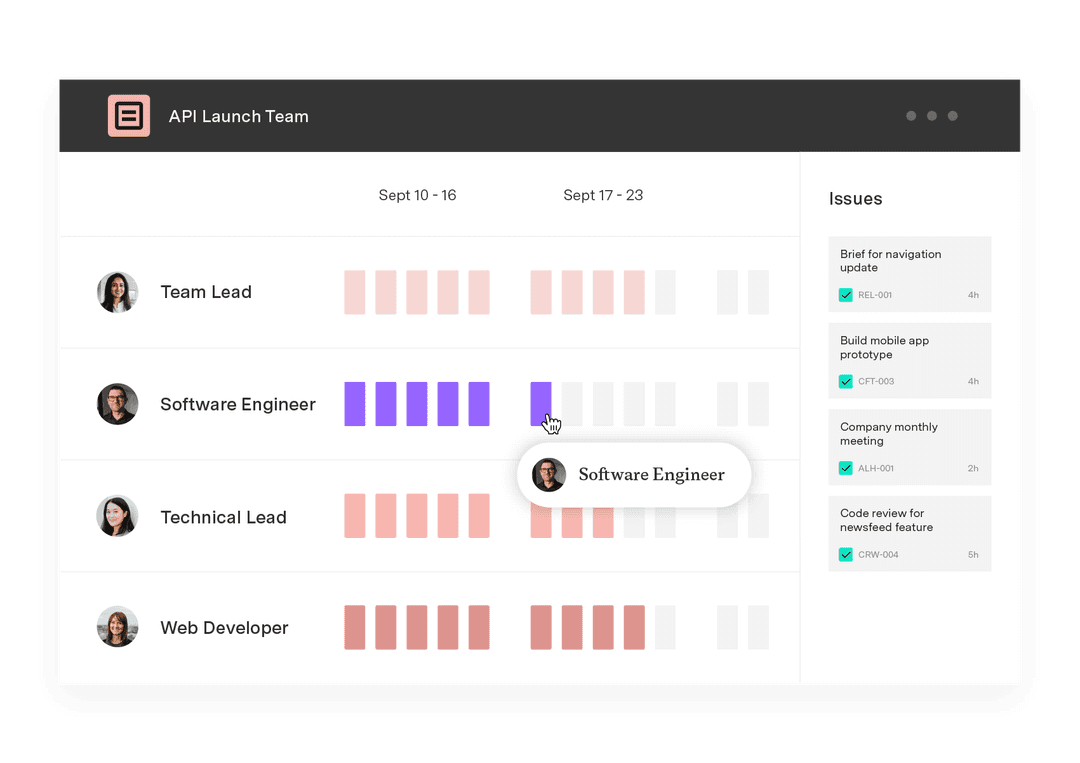Best B2B CRM software: Top platforms compared
Tempo Team
B2B sales often span months and require close coordination across multiple teams. The more clients you have, the easier it becomes to miss deadlines due to poor organization and subpar communication.
To keep everything moving smoothly, some organizations turn to B2B CRM software. A strong CRM acts as a centralized home for leads and accounts. It also connects every interaction, from initial outreach to project handoff, making it harder for key tasks to fall through the cracks.
In this article, we’ll explain what a B2B CRM is and what benefits it offers. Then we’ll introduce seven popular platforms and touch on how connecting your CRM to Tempo’s Jira-native tools bridges the gap between sales and delivery.
What’s B2B CRM software?
Managing B2B relationships is rarely simple. Without the right system and tools, it’s easy for details to slip through the cracks and for opportunities to stall.
Business-to-business customer relationship management (B2B CRM) software is a centralized platform for managing your interactions with clients. Unlike consumer-focused CRMs, the features and core design will account for longer sales cycles and higher-value deals.
B2B CRM tools often include:
Opportunity and lead management features
Account-based marketing tools
Sales pipeline tracking
Workflow automations
Reporting and analytics
In practice, B2B CRM software gives sales and marketing teams the structure to work together more effectively. It can also improve forecasting accuracy and strengthen long-term relationships with clients.
What role does B2B CRM software play in the sales process?
B2B CRM software is designed to track and optimize every step of the sales journey. This makes it a complex tool with many functions.
If you’ve never used this type of software, it can be hard to grasp what role it might play in your business operations. When used effectively, a B2B CRM platform:
Centralizes customer data: It collects every contact detail, document, and interaction into one accessible platform. Instead of searching through information spread across various spreadsheets or email chains, team members can find what they need quickly.
Automates key processes: You can often automate routine tasks like sending follow-ups, logging calls, and scoring leads.
Manages complex sales cycles: Business-to-business sales can last for months, sometimes years. A CRM platform provides a clear pipeline of visibility, helping teams track progress and anticipate roadblocks.
Connects multiple stakeholders: B2B decisions rarely come down to just one person. Instead, they involve multiple decision makers across several departments. CRM systems allow you to map out every stakeholder and record their roles and priorities.
Scales with business growth: As companies grow, managing client data manually becomes unsustainable. CRMs handle the increasing volume of contacts and workflows without sacrificing performance (or requiring you to switch platforms).
What are the benefits of using B2B CRM software?
A B2B CRM system isn’t just a database. It’s a growth enabler that has measurable effects on many key workflows and metrics. Here are some of the main advantages:
Clearer visibility into the sales pipeline: CRM software gives managers and reps a complete view of every opportunity in play. Teams can spot deals at risk of stalling and tailor outreach to each sales pipeline stage.
Increased productivity: With clear workflows in place, along with handy marketing automations and reminders, sales reps spend less time on repetitive tasks like follow-ups and data entry. That time gets redirected toward building client relationships.
Improved customer retention: A well-maintained CRM offers clients proactive support. Plus, account managers can track renewals and flag upsell opportunities easily. This strengthens communication with clients and prospects, and makes it easier to maintain long-term relationships.
Better alignment between departments: A CRM tool provides shared access to leads, campaign data, customer interactions, and upcoming tasks. This helps your sales and marketing teams work toward the same goals. Pairing CRM data with OKR software makes it even easier to track alignment.
Deeper insights: CRMs collect and analyze large volumes of customer and sales pipeline data. Real-time reporting helps leaders understand where deals are stalling and which behaviors signal buying intent.
Improved forecasting and planning accuracy: By analyzing historical data and market trends, CRMs help you predict future sales with greater accuracy. This improves resource allocation, inventory planning, and revenue projections.
7 CRM platforms for growing B2B companies
If your company doesn’t have a CRM platform yet, now is the perfect time to adopt one. There are many options – let’s look at what seven of the most popular tools have to offer.
Even if you don’t choose one of these B2B CRM examples, you’ll know what’s possible and understand what key features to look for.
1. Salesforce Service Cloud
Salesforce is often considered the gold standard in B2B CRM software. It offers extensive customization options and robust sales pipeline tracking. It also features AI-driven analytics and thousands of integrations. Many organizations prefer Salesforce for its scalability and ability to handle complex, multi-stakeholder sales environments.
Standout feature: Salesforce integrates well with knowledge base software, making it useful for teams layering in customer support or knowledge sharing.
2. HubSpot
HubSpot is a great CRM for B2B marketing. It combines relationship management with marketing automation and customer service, bringing them all into a single ecosystem. HubSpot also has a user-friendly interface and a free starter tier, making it accessible to smaller companies (while still scaling well).
Standout feature: With HubSpot, you get built-in marketing automation that ties campaigns directly to sales outcomes.
3. Zoho CRM
Next on our list, Zoho CRM stands out for its affordability and flexibility. It provides lead scoring, workflow automation, and predictive AI, all of which help teams prioritize opportunities. With over 500 integrations and a dedicated mobile app, Zoho makes enterprise-grade CRM software accessible to growing businesses. It’s often considered one of the best CRMs for B2B startups.
Standout feature: The AI-powered sales assistant (Zia) delivers insights and forecasts as well as workflow suggestions.
4. Freshsales
If your workflows tend to involve many individuals or teams, Freshsales by Freshworks is worth a look. Its intuitive interface and built-in communication tools (email and chat) streamline complex tasks and keep everyone on the same page. The AI-based lead scoring feature helps your sales team focus on the most promising prospects and track multiple deal stages.
Standout feature: The integrated and robust communication tools allow for seamless prospect engagement.
5. Pipedrive
Pipedrive takes a very visual approach to sales pipeline management. Its drag-and-drop deal boards make it easy to see where opportunities stand. At the same time, its many automation features reduce administrative work. Pipedrive is a favorite of sales teams that value simplicity but don’t want to sacrifice functionality.
Standout feature: Pipedrive’s visual pipeline management keeps deals moving forward by making the process more intuitive and accessible.
6. Zendesk Sell
Zendesk Sell extends the Zendesk suite beyond customer support, providing full CRM capabilities. It excels at connecting sales with service, giving teams complete visibility into pre and post-sale interactions. This platform also provides some powerful sales forecasting and lead enrichment features.
Standout feature: The deep integration between Zendesk’s various customer support tools offers a unified customer view.
7. Dynamics 365 Sales
If your business is heavily invested in the Microsoft suite of tools, Dynamics 365 Sales should be on your shortlist. This platform combines CRM and enterprise resource planning (ERP) into an all-in-one solution. Plus, it offers AI-driven insights and dynamic reporting tools that support complex global operations.
Standout feature: This B2B CRM tool provides full integration with Microsoft products like Outlook, Teams, and Power BI. There’s also an open API for more technically-minded teams.
Connect customer relationships to project execution with Tempo
Winning a deal and delivering on your promises requires a smooth handoff: all the way from project planning to sales to operations. Tempo’s Jira-native tools help you manage that complex journey efficiently, saving you time and keeping clients happy.
Capacity Planner provides project managers with a complete overview of team availability. This helps you allocate resources more effectively. Plus, you’ll know whether your business has the bandwidth to meet client expectations before a project even begins.
Timesheets clarifies how much effort and cost goes into servicing each account. With it, you’ll track billable and non-billable hours directly in Jira. The payoff? More accurate project costing and more informed decisions about future deals.
Together, these tools create a bridge between business relationship management and project execution. When you pair a quality B2B CRM tool with Capacity Planner and Timesheets, you set your entire team up for success.














































